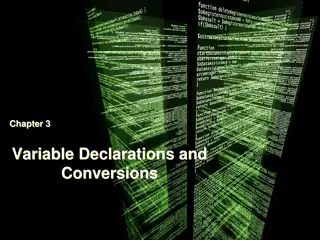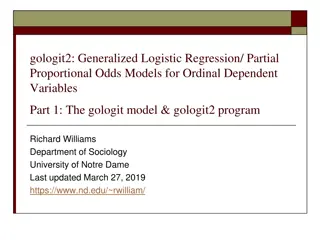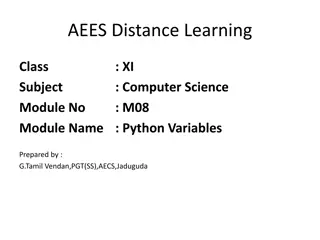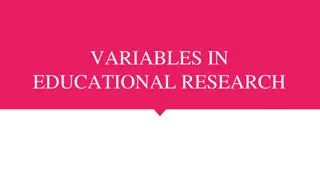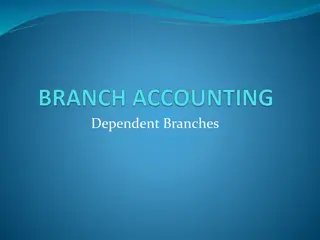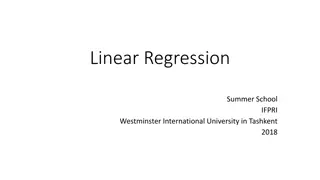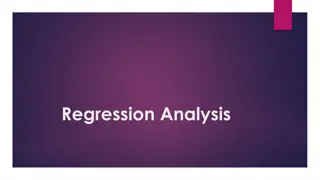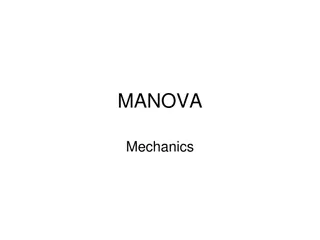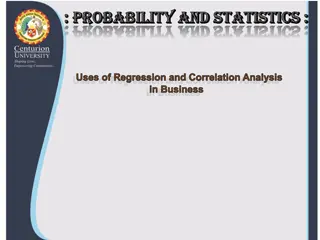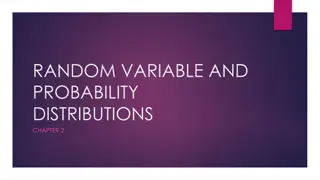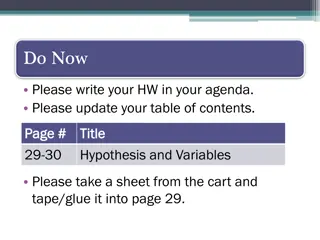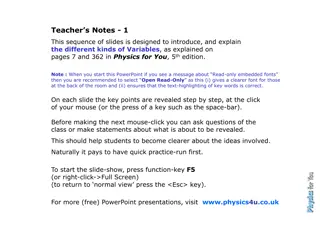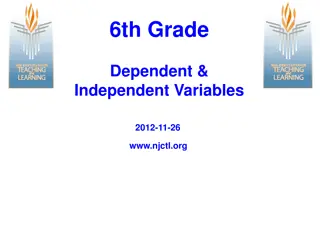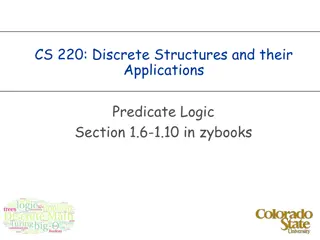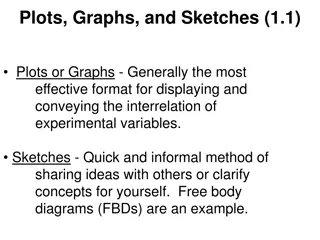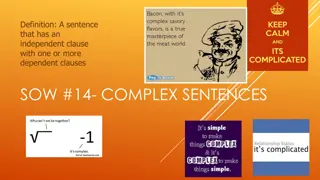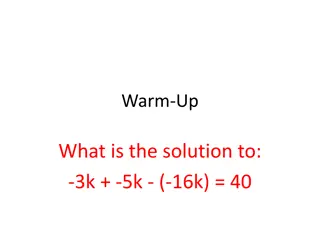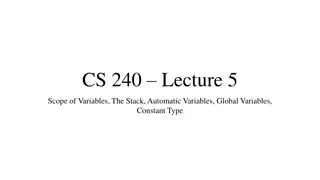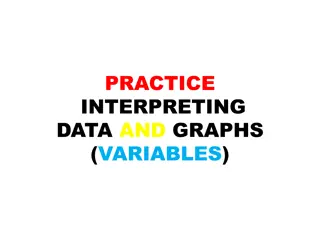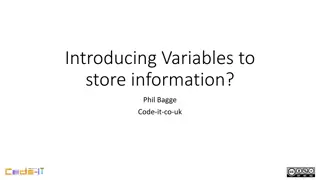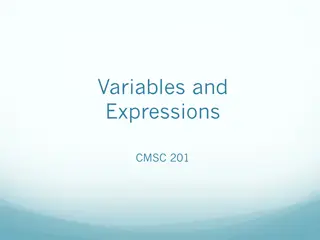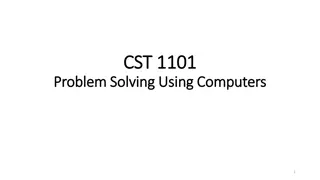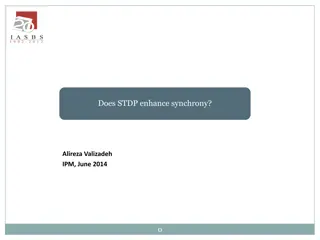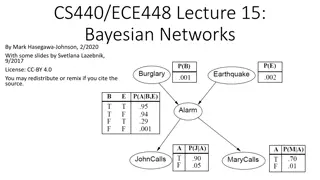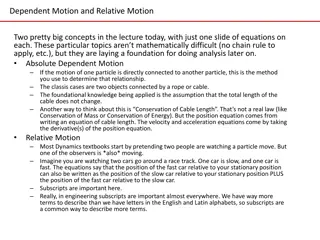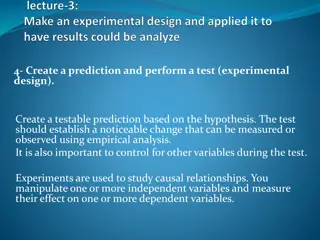Understanding Dummy Variables in Regression Analysis
Dummy variables are essential in regression analysis to quantify qualitative variables that influence the dependent variable. They represent attributes like gender, education level, or region with binary values (0 or 1). Econometricians use dummy variables as proxies for unmeasurable factors. These
3 views • 19 slides
Understanding Variables in Research Studies
Variables in research studies play crucial roles in examining relationships and drawing conclusions. They include independent variables that influence outcomes, dependent variables affected by independent ones, moderator variables that strengthen or weaken relationships, intervening variables lying
7 views • 34 slides
Constructing and Analyzing Function Tables: CC Math 6 Expressions and Equations Unit 3
This instructional material provides resources for teachers to help students understand how to represent real-world problems using variables, write equations, analyze relationships between variables, and use graphs and tables. The content covers Common Core Standards 6.EE.9, focusing on using variab
2 views • 22 slides
Understanding Variables and Control in Research Design
In research design, variables play crucial roles as either dependent or independent factors, with extraneous variables potentially affecting study outcomes. Controlling for extraneous variables is essential to attribute effects solely to the independent variables. Research hypotheses aim to test pre
0 views • 6 slides
Understanding Independent and Dependent Clauses
An independent clause contains a subject and a verb, forming a complete sentence on its own, while a dependent clause also has a subject and a verb but cannot stand alone. Dependent clauses rely on independent clauses to form complete sentences and are introduced by subordinating conjunctions. When
0 views • 4 slides
Understanding Research Hypothesis and Variables in Academic Studies
Research hypothesis plays a crucial role in academic research by providing a probable solution to a research problem. It establishes relationships between different variables, which are empirical properties that can vary. Variables can be independent, dependent, confounding, or intervening, influenc
0 views • 15 slides
Understanding Variable Declarations and Conversions in Java
Properly declaring variables in Java is essential before using them. This chapter covers different types of variable declarations, including class variables, instance variables, local variables, and parameter variables. It also explains the concept of type casting and the importance of explicitly de
1 views • 23 slides
Understanding Random Variables and Their Applications in Various Fields
Random variables play a crucial role in statistics, engineering, and business applications. They can be discrete or continuous, depending on the nature of the outcomes. Discrete random variables have countable values, while continuous random variables can take on any real number. This article explor
0 views • 6 slides
Overview of gologit2: Generalized Logistic Regression Models for Ordinal Dependent Variables
gologit2 is an advanced program for estimating generalized logistic regression models, including proportional odds, generalized ordered logit, and partial proportional odds models. It offers features beyond traditional ologit, allowing for less restrictive and more parsimonious modeling of ordinal d
0 views • 27 slides
Python Variables: Understanding Declaration, Naming Rules, and Assignment Operators
Python variables are essential for storing values in reserved memory locations. This article covers the basics of variables in Python, including declaration, assigning values, naming rules, multiple assignments, deleting variables, and assignment operators. Learn how to create, name, and manipulate
0 views • 11 slides
Understanding Variables in Educational Research
Variables in educational research play a crucial role as symbols of events, traits, or characteristics that can be measured and categorized. Different types of variables such as change, effect, and outcome variables are essential in studying causal relationships. Dependent variables represent outcom
6 views • 17 slides
Understanding Dependent Branches in Business Operations
In any business undertaking, as the business expands, it often establishes branches to market products over a wider territory. Dependent branches rely on the head office for supply of goods and cash, and do not maintain separate accounts. This article explores the types of branches, features of depe
1 views • 5 slides
Understanding Linear Regression: Concepts and Applications
Linear regression is a statistical method for modeling the relationship between a dependent variable and one or more independent variables. It involves estimating and predicting the expected values of the dependent variable based on the known values of the independent variables. Terminology and nota
0 views • 30 slides
Understanding Regression Analysis: A Statistical Tool for Relationship Measurement
Regression analysis is a statistical technique developed by Sir Francis Galton in 1877 to measure the relationship between variables, one dependent on the other. This analysis helps estimate unknown values of a dependent variable based on known values of an independent variable. It is widely used in
0 views • 10 slides
Understanding MANOVA: Mechanics and Applications
MANOVA is a multivariate generalization of ANOVA, examining the relationship between multiple dependent variables and factors simultaneously. It involves complex statistical computations, matrix operations, and hypothesis testing to analyze the effects of independent variables on linear combinations
0 views • 16 slides
Applications of Regression and Correlation Analysis in Business
Regression and correlation analysis play vital roles in business, helping to quantify relationships between variables. Regression analysis estimates relationships between dependent and independent variables, while correlation analysis quantifies associations between continuous variables. These techn
0 views • 9 slides
Understanding Random Variables and Probability Distributions
Random variables are variables whose values are unknown and can be discrete or continuous. Probability distributions provide the likelihood of outcomes in a random experiment. Learn how random variables are used in quantifying outcomes and differentiating from algebraic variables. Explore types of r
0 views • 13 slides
Understanding Variables, Hypothesis, and Experimental Design
Variables play a crucial role in experiments, with the independent variable being the condition that is changed, and the dependent variable being the factor affected by the change. Control variables must remain constant. Hypothesis is an educated guess that can be tested. Explore the relationship be
0 views • 13 slides
Understanding Variables in Physics: A Comprehensive Guide
This presentation introduces and explains different types of variables in Physics, emphasizing the concepts of independent, dependent, and control variables. It provides practical examples and tips for identifying variables in experiments, aiming to enhance students' understanding of scientific meth
2 views • 24 slides
Understanding Dependent and Independent Variables in 6th Grade Science
Explore the concepts of dependent and independent variables in 6th-grade science with clear explanations and examples. Learn how these variables are defined, understand their relationship, and discover how to identify them in various scenarios using tables and equations.
0 views • 14 slides
Understanding Experimental Variables and Design
Explore the concept of variables in experiments, including independent, dependent, and controlled variables. Learn how to identify and apply them in investigations, such as determining the impact of different ages on puzzle-solving speed. Discover the key elements essential for conducting fair and v
0 views • 21 slides
Understanding Predicate Logic: From Propositional to Predicate Logic
Transitioning from propositional to predicate logic allows reasoning about statements with variables without assigning specific values to them. Predicates are logical statements dependent on variables, with truth values based on those variables. Explore domains, truth values, and practical applicati
0 views • 34 slides
Understanding Plots, Graphs, and Variables in Science
Effective communication in science involves utilizing plots, graphs, and sketches to showcase the interrelation of experimental variables. Understanding functions, dependent and independent variables, and interpreting curves play crucial roles in scientific analysis. The importance of unit systems a
0 views • 43 slides
Kaseya Fundamentals Workshop - Agent Procedures and Variables Overview
Discover the key aspects of Agent Procedures and Variables in Kaseya Fundamentals Workshop, including Managed Variables, Global Variables, and Public Variables. Explore examples of Agent Procedures and learn about Application Deployment, Windows Registry Modification, and more. Gain insights into Pr
0 views • 23 slides
Understanding Complex Sentences in English Grammar
Complex sentences consist of an independent clause along with one or more dependent clauses. The independent clause can stand alone, while the dependent clauses rely on the independent clause for meaning. Differentiating between independent and dependent clauses is essential in understanding how com
0 views • 15 slides
Understanding Independent and Dependent Variables in Algebra
Learn about independent and dependent variables in algebraic situations, equations, tables, and graphs. Discover the role of each variable, how they are classified, and their impact on functions. Practice identifying independent and dependent variables through examples and understand their significa
0 views • 55 slides
Understanding Memory Stack and Variable Scope in Computer Architecture
This content delves into the scope of variables, the stack in memory architecture, automatic and global variables, and the concept of constant types. It explains the functioning of the stack, how function calls are managed, and the allocation of variables within stack frames. The relationship betwee
0 views • 18 slides
Understanding Data and Graphs: Variables Analysis
Practice interpreting data and graphs related to variables such as independent and dependent variables. Analyze circle, line, and bar graphs, data tables, and charts to understand concepts like time allocation, car trip details, demand and price relationship, atomic element properties, mass-force co
0 views • 17 slides
Understanding Variables in Programming
Variables in programming act as containers to store information. They are essential in languages like Scratch to hold values. Computers use labels to identify variables, and values stored inside can be accessed by reading the labels. Programming utilizes commands like "var" to define variables and s
0 views • 23 slides
Exploring Data Relationships and Variables in Everyday Life
Discover the importance of data in decision-making, interpretation, and answering questions through examples of one-variable and two-variable data sets. Learn about independent and dependent variables, and how to graph data to visually represent relationships. Dive into real-world examples like spec
0 views • 19 slides
Introduction to Variables and Expressions in Python
Today we start Python! Learn about variables, how to create them, assign values, and perform mathematical operations using variables in Python. Understand the rules for naming variables and how they are essential for storing and managing information in your programs. Explore different types of varia
0 views • 16 slides
Understanding Variables in Programming and Memory Concepts
Variables are essential in programming as they allow temporary storage of data within a program. This content delves into the concept of variables, their importance, and how they function in memory. It explains the relationship between variable names and memory locations, discusses data types, and h
0 views • 19 slides
Understanding Variables in Economics
Variables in economics, such as dependent, independent, endogenous, and exogenous variables, play a crucial role in analyzing economic phenomena. Dependent variables are influenced by changes in other variables, while independent variables are not. Endogenous variables are internal and need to be pr
0 views • 8 slides
Exploring the Effects of Spike-Timing-Dependent Plasticity (STDP) on Synchrony in Neural Networks
This presentation delves into the impact of Spike-Timing-Dependent Plasticity (STDP) on synchrony within neural networks, examining how the structural effects of STDP enhance synchrony and influence network dynamics. Various forms of STDP, such as pair-based additive STDP and variations like nonline
0 views • 13 slides
The Art of Variables in Programming and Delicious Sandwiches
Explore the concept of variables in programming using fun analogies of creating a PBJ sandwich and a s'more. Understand how variables act as containers to store important information in code. Discover the ingredients needed for each delicious treat and learn how variables play a crucial role in both
0 views • 5 slides
Enhancing Reading Comprehension Through Text-Dependent Questions
This resource delves into the significance of text-dependent questions in improving students' reading comprehension skills by emphasizing the importance of evidence from the text, building knowledge through nonfiction, and developing critical thinking abilities. It highlights key advances in educati
0 views • 16 slides
Understanding Bayesian Networks for Efficient Probabilistic Inference
Bayesian networks, also known as graphical models, provide a compact and efficient way to represent complex joint probability distributions involving hidden variables. By depicting conditional independence relationships between random variables in a graph, Bayesian networks facilitate Bayesian infer
0 views • 33 slides
Understanding Dependent and Relative Motion in Dynamics
Dependent Motion and Relative Motion are fundamental concepts in Dynamics, providing the foundation for future analysis. Dependent Motion involves constraints like ropes or cables, while Relative Motion considers observers in motion. Dynamics involves applying a limited set of equations in diverse w
0 views • 18 slides
Designing a Controlled Experiment: Steps and Considerations
Experimental design involves systematically testing hypotheses by manipulating independent variables and measuring their effects on dependent variables. This process includes considering variables, designing treatments, assigning subjects to groups, and planning measurements. To ensure valid conclus
0 views • 11 slides
Understanding Global and Local Variables in Programming
Global and local variables play essential roles in programming. Global variables can be accessed by all functions within a program, while local variables are restricted to specific functions. This text explains the concepts with analogies and code examples to illustrate how variables are scoped in p
0 views • 8 slides






